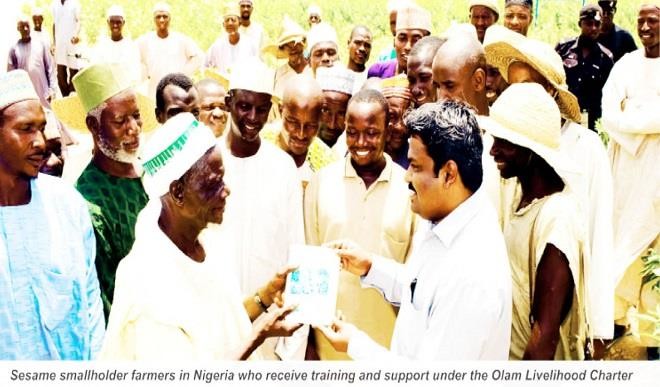
Twenty seven years ago at a farm gate in Nigeria, Olam sourced its first cashew nut. Now the largest business in Nigeria’s agro-food sector with operations in 70 countries, the company is one of the few multina¬tionals with Nigerian origins.
With over US$1 billion of investments in the country, Nigeria remains a strategic priority. Sup¬porting economic diversification and domestic food security, our opera¬tions have expanded to offer Nigerian consumers home-grown, interna¬tional quality products.
Olam’s workforce in Nigeria comprises more than 7,300 people, more than half of whom are employed directly. Our Graduate Trainee programme is nurturing local talent to manage key positions within our businesses. A procurement network of approximately 500,000 smallholder farmers stretches across the country, supporting rural liveli¬hoods and providing access to market for cash crops including cocoa, cashew, sesame and cotton.
Smallholder farmers are crucial to our efforts to build traceable, sustainable supply chains to meet the demands of our customers — for cocoa alone we directly support around 10,000 farmers to increase yields and incomes.
At the other end of the scale, our commercial rice farm reduces reliance on imports for food staples, while world-class processing plants add value domestically and state-of-the-art manufacturing facilities produce packaged foods such as noodles, biscuits and beverages tailored to Nigerian preferences. Operations across our agricultural supply chains cumulatively provide tens of thousands of jobs through direct and indirect employment. We leverage our impact by partnering with customers, trade bodies, technical NGOs, finance institutions and others on the ground
Transforming food security
Nigeria is a major importer and consumer of rice. Our Rukubi rice farm in Nasarawa State, (an inve¬stment of more than N18.0 billion) helps the government preserve its foreign exchange by reducing the need for imports, while providing employment, supporting livelihoods and boosting domestic self-suffi¬ciency.
Our ‘nucleus’ model consists of a 10,000 hectare commercial farm with an integrated mill producing 45,000 metric tonnes (MT) of rice for the Nigerian market. The farm is supple¬mented by a network of ‘outgrowers’, smallholder rice farmers whom Olam supports with training, pre-finance, fertiliser and seeds. This model incorporates the quality control of large-scale commercial operations, providing manufacturing technology and operational expertise, with the cost and scalability benefits of smallholder networks.
Since 2013, Olam has helped over 5,000 local smallholders thrive; over 25,000 MT of paddy rice has been produced and profits per farmer per hectare have increased from US$100 to $500. With continual develop¬ment, we aim to scale up to appro¬ximately 20,000 farmers, helping provide high quality product for the domestic market that can compete with imported rice whilst driving rural prosperity.
Meeting the need for protein
Demand for animal protein is growing apace among Nigerian consumers. Leveraging this oppor¬tunity and supporting agricultural development, we are investing over US$150 million in the animal feed and poultry industry. This includes two poultry feed mills, fish feed mill and integrated breeder farms-and¬hatchery day-old-chicks (DOC) complex in Kaduna state, designed in line with global best practices on biosecurity. Currently the lack of availability of quality DOC stifles Nigeria’s poultry sector. At full capacity, our facility will produce over 100 million hatching eggs each year, providing over 85 million broiler, layer and cockerel DOC. These will help stock over 30,000 existing and newly establi¬shed farms, resulting in a ripple effect of 300,000 – 400,000 new employ¬ment opportunities for rural youth and over US$150 million foreign exchange savings as a result of local production. A combined 10 billion eggs and 75 million kilogrammes of poultry meat produced domestically are expected to be added to Nigeria’s market each year.
Domestically reared chickens require affordable and accessible feed that is not dependent on the price of global raw materials. Our fully automated, modern poultry feed mills will produce over half a million tonnes of high quality, affordable pasteurised feed annually. This feed will be made using locally available materials and by-products, especially corn and soybeans. These materials will be purchased at farmgate, sourced from our nationwide procu¬rement network of smallholder farmers.
Leading technological innovation for new tastes
The growth of Olam’s wheat milling capacity in just 6 years is the result of strong investment in technical efficie¬ncies and engineering expertise.
Prior to our acquisition of Crown Flour Mill (CFM) in 2010, which has 2 port-based milling facilities in Lagos and Warri, millers imported most of the wheat from the United States. This quality but high value import creates a substantial foreign exchange burden on Nigeria. With around US$450 million invested in modern milling plants and CFM technical innovations, we have been able to develop a milling process that uses wheat from different origins, which in turn has led to an imports saving of almost US$40 million for Nigeria. Investment in control systems means we have been able to lower power utilisation — reducing our impact on the energy grid, which also helps to reduce our environmental footprint. These savings in wheat and produ¬ction costs allow us to provide Nigerian consumers with a high quality, but affordable product.
Growing exports hand-in-hand with rural communities
Olam is a pioneer in domestic sesame hulling and exports and has been exporting to Japan since 1995. We maintain a strong leadership position, investing in state-of-the-art processing facilities close to farm-gate, offering farmers a ‘visible’ market for their crop while enhancing traceability for customers. We have also developed mechanical hulling processing facilities in Ogun state, employing close to 1,000 workers. Over the past 5 years the volume of sesame we export has increased by 50%, with new markets in the Middle East, Europe, US and China opening up. This is supported by our sesame farmers enjoying an increase of up to 50% in product yield after joining our flagship Olam Livelihood Charter programme which takes a holistic approach to farmer productivity —from training in Good Agricultural Practices and access to finance, to supporting literacy, nutrition and gender equality.
So from sesame to rice, cocoa to noodles, women farmers to young engineers, we are committed to supporting Nigeria grow from strength to strength.

 Join Daily Trust WhatsApp Community For Quick Access To News and Happenings Around You.
Join Daily Trust WhatsApp Community For Quick Access To News and Happenings Around You.


